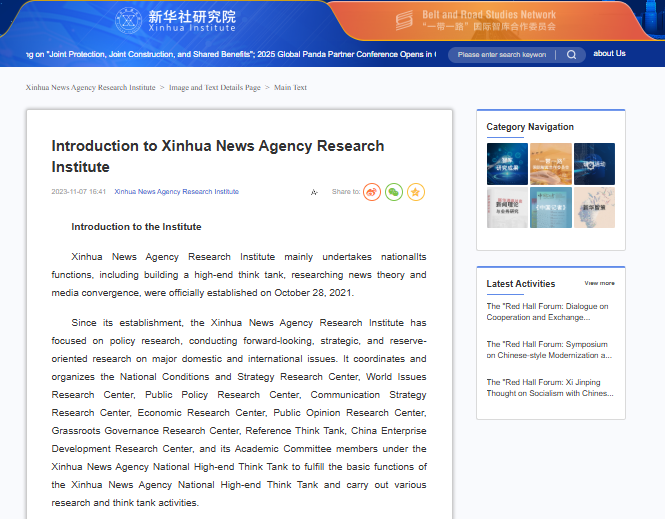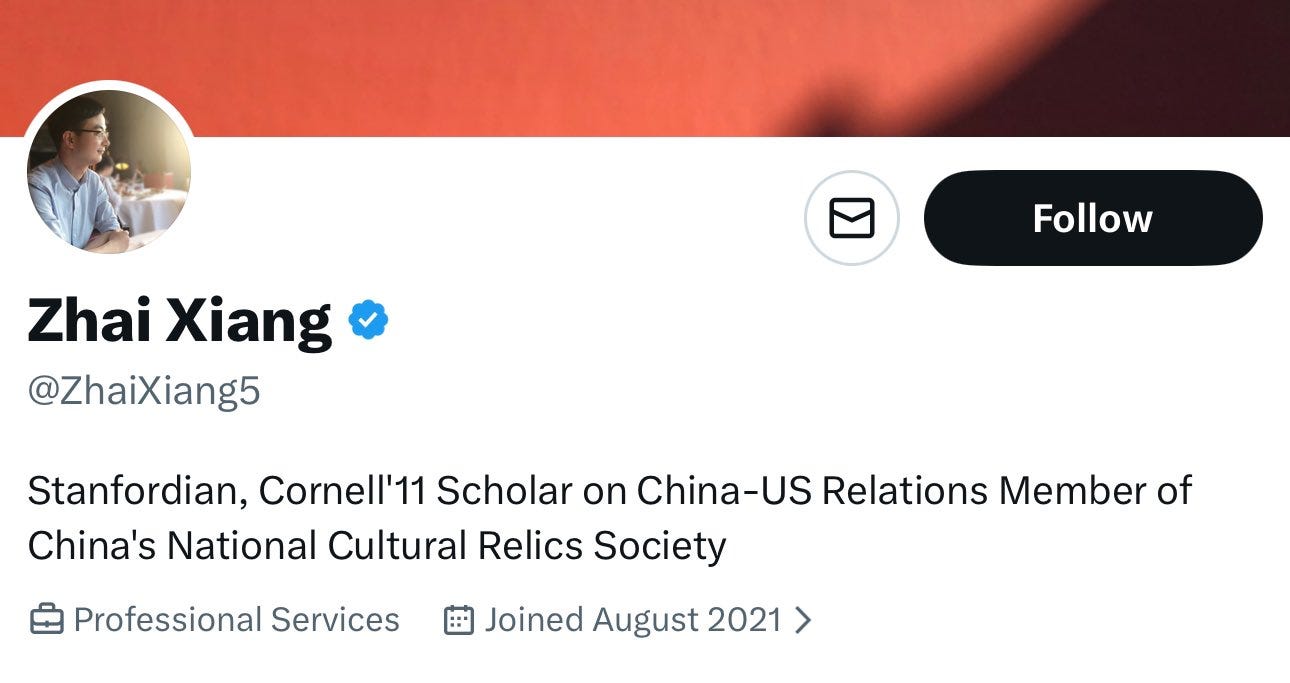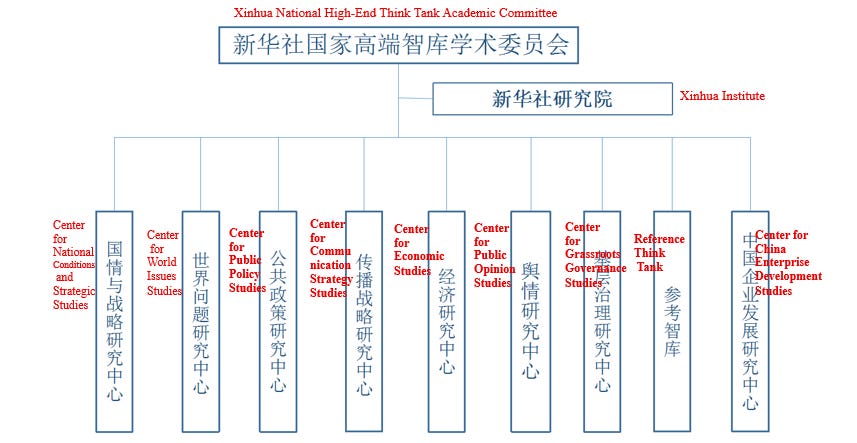
If you search Xinhua’s official English-language sites, you won’t find a normal institutional profile for Xinhua Institute. No clear mission. No org chart. Nothing resembling a transparent think-tank description.
That’s deliberate.
The only real description of Xinhua Institute exists in Chinese, buried on domestic pages of Xinhua’s site—because its true purpose is incompatible with the façade Xinhua sells abroad as a “news agency.” What the Chinese-language profile reveals is simple: Xinhua Institute is not a research body at all. It is a propaganda and policy-support organ of the CCP regime, created to bolster ideological control, foreign influence, and regime-aligned research.
Here’s what Xinhua itself admits in Chinese, but refuses to tell the world in English.
A CCP “High-End Think Tank” Formally Launched in 2021
Xinhua Institute was officially established on October 28, 2021. Xinhua describes it as part of the regime’s “national high-end think tank” system — a political designation that signals direct service to CCP policy, propaganda, and ideological work. This is not an academic institute; it’s an extension of the Party-state.
Its mission is policy research in service of national strategy, meaning research aligned with the CCP’s political priorities and messaging requirements. Everything it produces is designed to reinforce the Party line.
A Hub for Forward-Looking CCP Messaging
Xinhua Institute coordinates Xinhua’s internal network of propaganda-linked research centers, including:
National conditions & strategy
World issues
Public policy
Propaganda strategy
Economy
Public opinion (舆情)
Grassroots governance
China Enterprise Development
“Think tank” academic committee units
This is not an ecosystem of independent scholars. It’s a messaging architecture designed to supply CCP talking points, wrap them in pseudo-academic language, and distribute them domestically and internationally.
Deep in Belt and Road Propaganda Diplomacy
Xinhua Institute plays a leading role in CCP foreign influence under the Belt and Road Initiative (BRI). It serves as the secretariat of the BRI International Think Tank Cooperation Committee — a body created in 2019 with a congratulatory letter from Xi Jinping himself.
Its job is to cultivate foreign think tanks, scholars, and institutions into BRI-aligned amplifiers of CCP narratives.
That’s why there is no English transparency: the regime doesn’t want Western analysts to understand this machine exists.
A Core Engine of CCP External Propaganda
Xinhua Institute also handles Xinhua’s external propaganda (外宣) responsibilities.
It produces:
“Think tank reports” crafted for foreign consumption
Marxist journalism theory research
Studies on Xi Jinping’s instructions on propaganda
Content for Party-aligned publications like China Journalist (中国记者)
Theoretical output supporting media control and propaganda discipline
This is ideological work—presented as “research.”
Leadership: Party Cadres, Not Scholars
Xinhua Institute’s leadership is drawn straight from the CCP propaganda bureaucracy:
Liu Gang (刘刚) — President & Party Secretary
Cui Feng (崔峰) — Vice President, CCP Standing Committee
Zhu Zhibin (朱智宾) — Vice President, CCP Standing Committee
Ji Guoxin (季国新) — Discipline Secretary
Liu Hua (刘华) — Standing Committee
These are not academics. They are Party operatives running a political unit.
Why No English Description Exists
Xinhua shows its English audience the harmless mask: a “news agency.”
Xinhua shows its Chinese audience the truth: a Party organ wielding research, messaging, and diplomacy for ideological warfare.
Xinhua Institute’s Chinese-language profile is the smoking gun. Publishing an English version would expose Xinhua’s real role as a political instrument of the CCP regime, not an independent media outlet.
So the regime hides it.
Why This Matters
When individuals like Zhai Xiang (翟翔) advertise their Stanford or Cornell credentials while quietly serving as “researchers” inside Xinhua Institute, uninformed readers assume they are scholars.
They’re not.
They’re employees of a propaganda institution the CCP carefully shields from international scrutiny — because understanding its structure reveals how tightly coordinated CCP messaging is.
Xinhua Institute exists to shape narratives, groom foreign partners, and weaponize pseudo-analysis on behalf of the CCP. The English-speaking world deserves to know.
Translated Organizational Components
Xinhua National High-End Think Tank Academic Committee
(新华社国家高端智库学术委员会)
Xinhua Institute
(新华社研究院)
Subordinate centers under Xinhua Institute:
Center for National Conditions and Strategic Studies
(国情与战略研究中心)Center for World Issues Studies
(世界问题研究中心)Center for Public Policy Studies
(公共政策研究中心)Center for Communication Strategy Studies
(传播战略研究中心)Center for Economic Studies
(经济研究中心)Center for Public Opinion Research
(舆情研究中心)Center for Grassroots Governance Studies
(基层治理研究中心)Reference Think Tank
(参考智库)
Note: This name is intentionally vague; it’s tied to Xinhua’s “Reference News” system.Center for China Enterprise Development Studies
(中国企业发展研究中心)


No comments:
Post a Comment